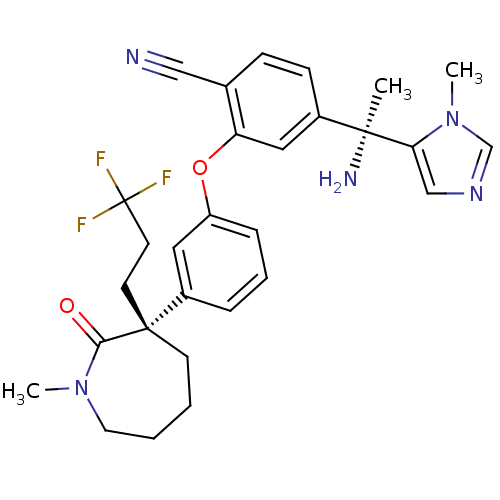BDBM50130365 4-[1-Amino-1-(3-methyl-3H-imidazol-4-yl)-ethyl]-2-{3-[1-methyl-2-oxo-3-(3,3,3-trifluoro-propyl)-azepan-3-yl]-phenoxy}-benzonitrile::CHEMBL316673
SMILES CN1CCCC[C@@](CCC(F)(F)F)(c2cccc(Oc3cc(ccc3C#N)[C@](C)(N)c3cncn3C)c2)C1=O
InChI Key InChIKey=CPCCCCDBCSOFNS-WUFINQPMSA-N
Activity Spreadsheet -- Enzyme Inhibition Constant Data from BindingDB
 Found 4 hits for monomerid = 50130365
Found 4 hits for monomerid = 50130365
TargetProtein farnesyltransferase subunit beta/geranylgeranyltransferase type-1 subunit alpha(Homo sapiens (Human))
Merck Research Laboratories
Curated by ChEMBL
Merck Research Laboratories
Curated by ChEMBL
Affinity DataEC50: 3.10nMAssay Description:Inhibition of hDJ2 protein farnesylationMore data for this Ligand-Target Pair
TargetGeranylgeranyl transferase type-1 subunit beta/Protein farnesyltransferase/geranylgeranyltransferase type-1 subunit alpha(Homo sapiens (Human))
Merck Research Laboratories
Curated by ChEMBL
Merck Research Laboratories
Curated by ChEMBL
Affinity DataEC50: 47nMAssay Description:Inhibition of Rap1a protein geranylgeranylation in human PSN1 cellsMore data for this Ligand-Target Pair
TargetProtein farnesyltransferase subunit beta/geranylgeranyltransferase type-1 subunit alpha(Homo sapiens (Human))
Merck Research Laboratories
Curated by ChEMBL
Merck Research Laboratories
Curated by ChEMBL
Affinity DataIC50: 0.190nMAssay Description:Concentration required to inhibit recombinant human farnesyltransferase (FTase) catalyzed incorporation of [3H]FPP into recombinant Ras-CVIM.More data for this Ligand-Target Pair
TargetGeranylgeranyl transferase type-1 subunit beta/Protein farnesyltransferase/geranylgeranyltransferase type-1 subunit alpha(Homo sapiens (Human))
Merck Research Laboratories
Curated by ChEMBL
Merck Research Laboratories
Curated by ChEMBL
Affinity DataIC50: 2.5nMAssay Description:Concentration required to inhibit recombinant human geranylgeranyl transferase type I (GGTase-I) catalyzed incorporation of [3H]GGPP to the C-terminu...More data for this Ligand-Target Pair
